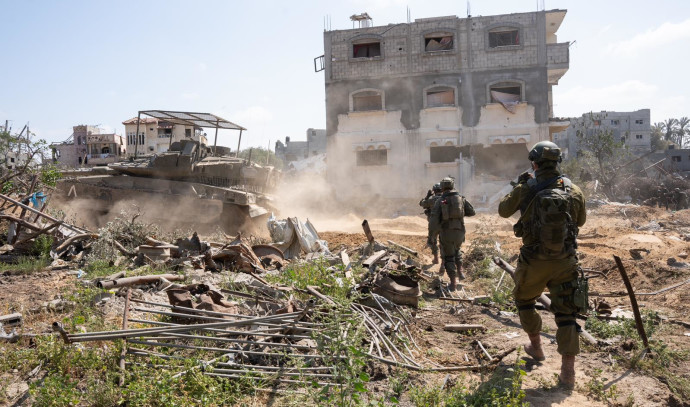Three IDF divisions were back fighting Hamas in Gaza on Sunday, with the 98th division in Jabalya in northern Gaza commanded by Brig.-Gen. Dan Goldfus, the 98th division in Zeitoun in north-central Gaza commanded by Brig.-Gen. Barak Hiram, and the 162nd division in Rafah in southern Gaza commanded by Brig.-Gen. Itzik Cohen.
While the high point of the invasion in October-November had five divisions in Gaza, there was only one division, the 162nd, still there by April 7, and even that division was no longer at full strength.
This means that the IDF is about halfway back to its full strength point in Gaza earlier in the war and signals the failure to prevent Hamas from quickly returning to power after seven months of war through small scale “clean-up” operations.
The IDF said it attacked over 150 targets on Saturday-Sunday, with wide use of air and artillery power, after a period in which foot soldiers had maintained order with only limited air strikes.
IDF tells residents of Jabalya to evacuate, signaling new op.
Another sign of increased intensity in the current fighting is the IDF’s announcement that 400,000 civilians have so far evacuated Rafah, and around 100,000-150,000 are expected to evacuate Jabalya.
The IDF said that its intelligence reported that Hamas was regrouping in Jabalya, but did not say how many terrorists had regrouped there.
An IDF source did suggest that Hamas had only started to reestablish command-and-control centers, so the IDF was hoping to intervene before the organization re-entrenched.
Over Friday to Sunday IDF forces in the three various areas killed a few dozen Hamas terrorists.
Palestinian reports indicated that IDF forces were already moving through Jabalya and that more than 60 Palestinians had been killed and over 110 injured, bringing the war total, according to Hamas’s Health Ministry to over 35,000 dead and over 78,000 wounded.
The defense establishment has said 15,000 of the dead are Hamas operatives and another 15,000 are wounded while some 2,000 were killed by Hamas rocket misfires.
Near the Rafah Crossing, the 162nd division found and destroyed several rocket launchers primed fire remotely at Israel.
IDF forces also destroyed tunnels, weapons storage areas, and other terror assets.
Criticism of Prime Minister Benjamin Netanyahu has increased within the IDF and includes Defense Minister Yoav Gallant who want to know who will replace Hamas. procrastination, they say, has given the terror group space to regroup and force the IDF back into Gaza in larger numbers.
Netanyahu has argued that deciding on a new political manager for Gaza must wait until the war is over, but the IDF and Gallant have countered that during the last few months in which the military have had operational control of nearly all of Gaza avoiding a decision was a missed opportunity.
In the shadow of the greatest crisis in Israeli-US relations in decades, following US President Joe Biden’s threat to halt all offensive weapons transfers should Jerusalem broaden the Rafah operation, IDF Chief of Staff Lt.-Gen. Herzi Halevi and US CENTCOM chief Gen. Michael Kurilla met in secret in recent days, the IDF revealed on Sunday.
Although such meetings between top US and Israeli defense officials usually indicate smooth relations, the announcement of the meeting took on a different tone in light of Biden’s threat, and no public sign from Netanyahu that he will try to avoid confrontation with the US.
Despite IDF assurances that Kurilla’s visit could help the allies prepare for future attacks from Iran or Hezbollah, it was unclear that their excellent personal-level relations could compensate for the chasm between Biden and Netanyahu.
Despite the IDF’s return to Gaza with heavy forces, following rocket alerts in the Kerem Shalom area on Sunday, the military confirmed that Hamas had managed two launches which had crossed into Israeli territory from Rafah. Both rockets were intercepted and no injuries or damage were reported.
There were also sirens during multiple rounds of rocket attacks on Sderot, Re’im, Nir Am, and other Gaza border villages.
Later Sunday, it was announced that a Hamas rocket struck Ashkelon, wounding three over the weekend. Hamas also fire rockets at Beersheba for the first time in months.
In the North, there were reports that Hezbollah had attacked either with a new kind of rocket, with drones, with an anti-tank missile, or with a mix of the above. At press time, the IDF, unusually, had not sent out any update about a response. No response would be a departure from usual procedure.

